|
Review and analysis of 2046
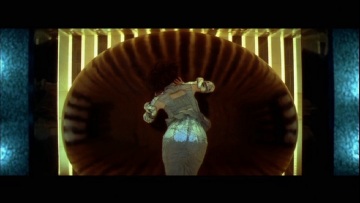 |
| Heart of darkness: sci-fi or not, 2046 is a dazzling production that is conspicuous in its style. The film dodges categorisation (as anything other than a WKW film) and rewards multiple viewings. |
Planned, shot and touched up over the course of a mammoth five years, 2046 is WKW’s riskiest production yet. And for a while it looked like he fumbled it - his infamous tardiness overflowed into Cannes 2004, and the result was the fury of the movie aristocracy. But since then things have settled down, and it has become easier to make an appraisal of this ‘sci-fi’, ‘In the Mood for Love sequel’, magnum opus of love, pain and regret.
Right from the beginning, 2046 makes its entry in an unashamedly grand fashion. From the first shot, zooming out from a giant black orb (an image later used to end the film, alluding to the ‘hole’ where secrets are buried), WKW makes it clear that this film will not be shy or inconspicuous.
But then the film makes an unexpected change in setting. From Takuya Kimura’s sci-fi traveller, who starts the film with his voiceover, the film soon shifts to the 1960’s and Tony Leung’s Chow Mo-Wan. A continuation of his ITMFL character, he is a moustachioed snappy dresser, even slicker than his previous incarnation. Returning to Hong Kong from a stint in Singapore, Tony is catching up with his past. He comes across night club dancer Carina Lau, who is treading the same steps in search of her ‘legless bird’. Tony also comes across an artefact of his past: the number 2046. The number of the room he shared with his one-time paramour, Maggie Cheung. This is another hotel and another room, yet he is drawn to the figure and its connection with his past. A writer by trade, he soon starts a science fiction story based on the number.
At the same time, Tony observes a new story - outside of his own. Faye Wong plays the first main character who hasn’t already interacted with Tony. She is the daughter of the hotel manager, and Tony - moving into the hotel ‘because of the number’ - spies the stormy progress of her relationship with a young Japanese man played by Takuya Kimura. But her father detests her choice of companion. The ‘storm’ in this case, the main obstruction, is her father’s dislike of the Japanese.
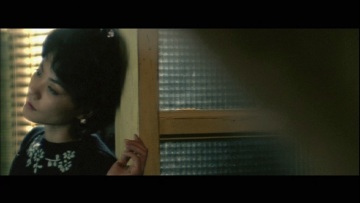 |
| The doors of perception: Faye is the daughter of the hotel owner, and she faces a very real social dilemma. She is outside of the venal life which Tony shares with others, but he is very much interested in her story. How will he interact with her? |
For those familiar with WKW’s films, this plot development may seem initially odd. WKW’s films have seldom made much drama out of social issues - a strength for many of his fans but a weakness for those reviewers who look to world cinema as if it is the answer to a sociological malaise in mainstream Western movies. And those looking for some in-depth, direct comment about racism, and the reaction of Hong Kong to its past may end up being frustrated once more as it seems that Faye’s father’s prejudice is there mostly to impede his daughter’s relationship. I.e. as a plot point. The tension to be resolved is that there is a barrier for Faye Wong to overcome. A social barrier in contrast to the existential barriers faced by WKW’s other characters.
Although Faye and Tony remain platonic throughout the course of the film, elsewhere Tony is very much exercising some kind of droit de signeur, in a way which seems very different from his character in ITMFL. The reasons for this caddish development in his persona are manifold - he best expresses himself in voiceover when he concedes that ‘there aren’t many perfect matches.’ And so he is happy to find casual relationships in bulk instead. But 1967’s riots put a dampener on his sexual adventures, as he is holed up indoors by a curfew and the ‘pineapples [bombs] in the street’. So this is when he gets down to writing 2046, a sci-fi serial populated with a dramatis personae from his own backstory. From the montage we witness, a sense of intensity, moodiness and longing pervades the story.
The 2046 serial points to one aspect of Tony’s persona, and this contrasts with the casual lifestyle he has cultivated centred on hedonism and easy sex, as reflected in his other writings. Creating soft porn with exaggerated modes of expression (hinted at by the frankly bizarre titles, such as The Diary of a Bazooka Hero) he is presenting a simple, marketable product - something he acknowledges when he says he’ll write anything to make a living. At the same time, with 2046 he finds a way to express something close to his heart, even if audiences won’t necessarily know this. Which expression is truer to Tony? The 2046 story which is associated with a deep memory of his? Or the erotic ‘anythings’ which he says he must write for his survival? The truth is we don’t know, although obviously the hint is that 2046 is a watershed for Tony as he plumbs his own memory, his own being, for a unique creation. The dividing line is clearly not the question of porn, as WKW makes it clear that the 2046 story is as ‘bizarre and erotic as possible’. What the distinction seems to be is between the core, personalised expression which 2046 is for Tony, and the shallow impersonality (so impersonal that someone else writes it for him at one point) of his everyday porn. The dichotomy places a question mark over Tony’s profession, and WKW seems to be playing with a concept which plagues so many successful artists - the line between autonomous creation and mass consumption. Not necessarily ‘what is art’ per se, rather the question of whether one produces what one wants to produce or, to quote Japanese author Haruki Murakami, one is ‘shovelling snow’.
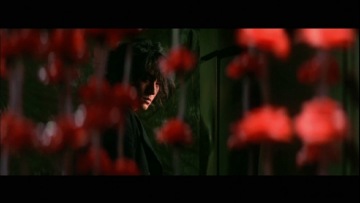 |
| Rosebud: we are given a fascinating, brief glance of Tony's creation, 2046. Clearly separated from his more regular soft-porn, it combines mass appeal with suggestive personal elements - why does he write it? To make money? To tell his audience something? Or to communicate with something within himself? |
The emergence of Zhang Ziyi’s character makes a significant impression on the middle of the film. Moving into room 2046 (Tony is next door in 2047), she plays Bai Ling, a luminously dressed good-time girl who is implied to be a prostitute (or a courtesan, as WKW explains in interviews).
When we initially see Ziyi, it is she who is outside of sex, whilst Tony is making a nuisance of himself as an amorous neighbour. By the medium of Tony’s friend, the impish middle-aged satyr known as Ping, Tony finds himself on-side with Ziyi. It is interesting to note this inversion of events - at no point does she solicit anything from Tony. She spurns his friend, and her profession is like some background detail. When she does allow Tony in - when he finds her after a break-up on Christmas Eve, 1967 - he agrees to be her ‘drinking pal’. But when they eventually reach sex he insults her by treating their tryst as a mere transaction. We are starting to see Tony’s new morality. The relationship they end up having reflects Tony’s desire to keep her at arm’s length, even if he inflicts cruelty as a result.
Why we give Tony some slack may be because we see something like a redemption with him and Faye Wong. Returning later on in the story, she is still struggling to stay with her boyfriend whilst avoiding the wrath of her father. And then Tony plays the role which has fascinated WKW in many of his films: the middleman. He offers to act as a secret postman for Faye, a crack in the wall between their rooms providing the conduit for her and Takuya Kimura’s letters.
The fruits of his endeavours, this proxy relationship, becomes more interesting for us and Tony. He makes no moves to take his relationship with Faye beyond a platonic basis, despite an unresolved desire being palpable. This seems strange for us, given how he has no problem acting on his desires for other women, so long as they do not impinge on the hole in his heart left by Maggie.
Faye’s dilemma, as mentioned before, is less of the complex WKW archetype. But that is not to say it is not important, just more straightforward. As some kind of counsellor (hilarious to think that her righteous father seems to approve of her spending time with her caddish neighbour), Tony puts her on the road to self-determination in her life and her relationship with Takuya. But in the process Faye and Tony’s spare time also start to intertwine. Time: that commodity prized by so many busy Hong Kong-ers, Tony seems to have too much of. Faye is pro-active here. She proffers him her writings - something she has been spending her own spare time on - to ask for his opinion. Tony’s approval allows them to share more time together.
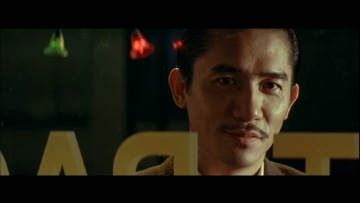 |
| A winter's tale: on Christmas Eve, 1968, Tony's altruistic, platonic relationship with Faye reaches its zenith. And she becomes unattainable. A redemption on one level, it is also illustrative of the characteristic WKW irony: as he slips out of the role of being a protagonist in her story, as he becomes an observer, this is the most touching moment. |
Writing, that action which arguably brought Tony and Maggie to their closest point, that action which is Tony’s livelihood, that action which can still reach into his deepest memories, or form some kind of titillation for an eager public. This begs the question, although Faye and Tony are never in any more than a platonic relationship, has he let her into a part of himself he had previously closed up? One of the most poignant moments in the film comes when he watches Faye from behind a window trying to call Takuya in Japan. It is Christmas Eve, 1968, and by this point Tony has helped Faye reach some form of independence. But his own feelings are literally behind glass as he watches Faye’s face light up - distance and a bad line are no obstacles to Faye and Takuya’s love. And Tony? It is almost as if he is a viewer - he cannot be anything over than a confidant to her.
This segment is telling, and appears as some form of redemption. For so long we have watched Tony indulge himself and hurt others. His debauchery and selfishness seem like some form of defence mechanism. With Faye, however, he is exercising an altruism which seems rare. The sequence is also bracketed on both sides by the writing of the story Tony says may be called 2047.
Alluded to as a development of his ideas in 2046, 2047 seems even more personal. Perhaps this is because now he is writing without the constraints not only of mass-market titillation, but also of the requirement for mass appeal altogether. No, 2047 has ostensibly been written only for Faye. At times, not even that.
The story follows a character played by Takuya, on a train leaving 2046. The sequence closely shadows the start of the film, and so we finally realise that the initial scenes were borne directly from Tony’s imagination. The difference is that now the voiceover is provided by Tony. This change makes a clear connection between himself and Takuya, his alter ego. That the 2047 Takuya is modelled on Faye’s boyfriend adds an extra twist: even though we connect 2047’s central character to Tony, from Faye’s point of view the 2047 Takuya is the man who is asking her for an answer, i.e. her real life Takuya. This is interesting as Tony is showing us a hint of the author’s intentions which would be lost to the reader (Faye). He writes himself into the character as he is pushing this proxy relationship. And by using the vehicle of fiction this is as close as he can get. The ‘reality’ pales in comparison with the ‘unreal’ connection he has here, and WKW orders the events (2047, 24 December 1968, and a shorter revisit to 2047) to emphasise the connection.
In 2047, WKW creates the idea of the affliction of ‘delayed emotions’. And the idea takes root in stylised sequences showing how the androids aboard the train react to past events and are unable to engage in the present. At first, this seems as outlandish and contrived as one could imagine, but then the irony sets in that this trait makes the androids profoundly human. After all, we are made up of collections of memories which will shape how we feel and act. So, in a sense, we are all doomed to be disconnected from the present. The delayed emotions have an echo in Tony’s reference to the emotions which ‘creep up on one unawares’ - he experienced this with Maggie, and now with Faye. The right emotion at the wrong time is one of those classic ironies which WKW handles so well.
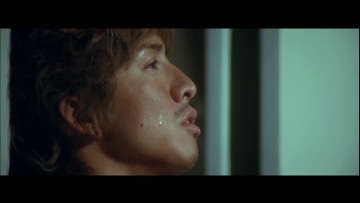 |
| How soon is now: Tony's alter ego is Takuya. Leaving the labyrinthine, metaphysical 2046 he finds it hard not to seek the 'warmth' of another. As he becomes entangled with an android, his love finds frustration - expectation and communication failing to unify. |
WKW is reaching something here. Not just lyricism. This is WKW at his most existential. Whilst writing 2047 Tony remarks that perhaps he isn’t writing it for Faye at all. Perhaps he is writing it for himself. Almost therapeutically, the idea shares a genesis with the narrator’s goal in Murakami’s Norwegian Wood: ‘That is why I am writing this book. To think. To understand. It just happens to be the way I’m made. I have to write things down to feel I fully comprehend them.’ Tony doesn’t promise full comprehension, but as and after he writes, he mulls over two ‘conclusions’ which come from 2047.
The first conclusion arises right after he has written the first draft. In the story, the Takuya character is unable to illicit a response from the Faye android. Reminding him of his lost love, he approaches her for the proxy connection she forms with his past. But then she grows her own characterisation. We saw this in Chungking Express, when Faye played with Tony’s emotions for his ex-girlfriend, and now Takuya is beginning to see the android as a distinct character with a new ‘warmth’. In other words, he starts out with the past emotions of a past relationship, then belatedly reacts to the new developments. When he receives no response he seeks an excuse, and the story brings up the idea of the delayed emotions which afflict androids. The first conclusion is that, due to her ‘illness’, she can’t respond to his emotions in the same time-frame. The advice from the train captain is that perhaps he should give up.
What this means is that the crossing of emotions, tragically, miss each other. Where love may have been reciprocated, there is instead disappointment on both sides. One 2047 scene hints at this: when Takuya can get no response, he tries repeating his question to all the other train crew. The irony is that the phrase we hear so many times in this film - ‘I have a secret to tell you’ - becomes absolutely no secret at all. And when we hear the Carina android recounting the ancient idea of whispering a secret into a tree, we know that this is something Takuya has confided to her. And Faye knows this too. It seems almost like a betrayal for her: what she shared with Takuya is now a publicly available commodity.
The alternative conclusion which Tony reaches - the second conclusion - is a little different. He formulates the idea after the events of 24 December 1968. At this point he had seen Faye when there were doubts in her mind. Rather than capitalise on this, Tony lets her use his office phone to reach Takuya in Japan. This dispels all doubts about Faye and Takuya’s relationship. Tony’s heartfelt look through the glass isn’t one of disappointment, though. Rather, it is almost like a calm epiphany. Looking back over his 2047 story, he revises his earlier conclusion. It is not, so he says, that she doesn’t love him. Rather, she is in love with someone else.
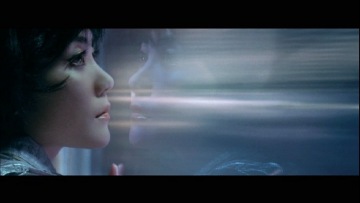 |
| Modern love: to conclude that Faye loves someone else brings WKW to one of his classic junctures - the unrequited love which his characters fall into. Rather than wrestle with the existential dilemmas of potential fruition they settle into a calming - if tragic - resignation. |
That may not seem like the most groundbreaking conclusion, and one may argue over just how the hell it differs from the first one anyway. But after a while it starts to make sense. On one level, it is a comfort for Tony (illusory or otherwise), to think that he is loved by Faye, but for her love for someone else. As he says, love is a matter of timing, and the second conclusion makes that pill far easier to swallow. Inexplicably, to have Faye love someone else seems a better set of events than to have Faye potentially requiting Tony’s love, but neither ever reaching a satisfactory nexus. On another level, the second conclusion reduces Tony to an observer, a third party. He may not get the happiness he seeks, but at least he knows that Faye has her lover, and perhaps she may be happy.
In effect, the distinction is between love frustrated and unrequited love. Love frustrated is exemplified by the events in Fallen Angels: Leon Lai and Michelle Reis spend the film moving to each other’s desires, and although Leon chooses to ‘terminate’ his partnership with Michelle, both are aware of (and fear) their potential emotions. But neither manages to reciprocate the other’s emotion at the same time - their love is not unified. In the end, they cannot sustain this situation and the love is frustrated in disastrous fashion. Unrequited love, on the other hand, is shown with Tony Leung Kar-Fei in Ashes of Time. He tells the viewer that he has loved Maggie, but has not acted on this. Instead, he chooses to watch her pine for the absent Leslie Cheung. Is he happy with this? Probably not. But neither is he frustrated. Instead, the situation is accepted with a stoic, zen-like calm.
The analogy with Ashes of Time here is strong. Both Tonys portray men who have become ‘unbridled’ in affairs of the heart. And in Ashes Tony realises that he has hurt many people. So, eventually, both Tonys refrain from acting on their love for one person, choosing unrequited love over the possibility of either rejection or fruition.
The difference is that in Ashes, Maggie is a tragic, doomed figure. In 2046, Faye is a figure who can attain happiness. And that’s what strikes us when we learn that she has made the move to Japan, to unify her and Takuya’s love. Just like Jackie Cheung’s character in Ashes, she has overcome a social barrier and she manages to move towards happiness in a way the central characters in Ashes and 2046 cannot. The realisation that dawns on Leslie and Tony in both films is a bittersweet one: they are different, their existential dilemmas are more difficult to resolve. It is what defines them. A revelation tinged with envy.
Some social realists may baulk at Faye’s father’s volte face - the simplicity with which the social dilemma is overcome - but it is essential in the set-up WKW has created. He is more interested in the existential barriers which his characters face. Social barriers are rare in WKW films, and their existence seems only to confirm that the existential barriers for his characters are of a different magnitude, a different species.
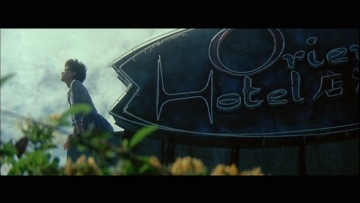 |
| Hotel California: as Faye challenges and overcomes her social barrier, we find the differences between her character and Tony: she is the 'independent' who can find happiness and who is, ultimately, outside of Tony's story. Unattainability and desirability go hand in hand - the 'sweetest fruit' of unrequited love. |
Out of the picture, Faye conveys a final parting shot for Tony: the challenge of making the end of 2047 happier. We don’t actually know what happens at the end of the story - the image is of the Faye android endlessly pining on the train for her missing love. But the challenge is one final confirmation of the difference between a character like Tony, and one like Faye. His existential paralysis becomes embodied in his sudden writers’ block: he is paralysed from making a decision which may bring happiness.
The film then moves to 18 months later, when Ziyi asks Tony out for a meal once more. But in the interim, something else has happened. As becomes clear later, Tony has made a visit to Singapore. He is there for a reason: to find Gong Li.
Many have remarked that the Gong Li sequences - which form a bracket near the start and end of the film - are underdeveloped in terms of narrative and, ultimately, audience engagement. But by seeing the film altogether it becomes a whole lot clearer where WKW may have been coming from. It is important to remember that even though the narrative is fragmented, Tony is the key connection. Developments in his character are brought through to each subsequent narrative strand. So we know that Tony has chosen the path of inaction with Faye Wong. But he has also been faced with the realisation that his inaction may be a key characteristic of his paralysis, his existential barrier. He cannot complete 2047 in the way Faye would. He cannot just board a plane or ship and reach happiness. Or can he?
By Christmas, 1969 he is in Singapore. We aren’t told when he left Hong Kong, but Christmas holds a special significance in 2046 as it is ‘when people need extra warmth’. Perhaps it can be suggested that right now Tony has brought himself to some kind of decision. Since his episode with Faye he has realised that he must face the challenge of making his own story’s ending happier. Seeing how Faye can prevail with perseverance (and, in an additional short scene, how Carina Lau can continue to persevere), he makes his own journey to rediscover a lost memory.
Maybe this is the hidden heart of the film. We see little of the Gong Li relationship, but it hints at an intensity which leaps from Tony’s character. Gong Li is, of course, Su Li-Zhen. Or at least she shares the same name as the character played by Maggie Cheung in In The Mood For Love. This remarkable coincidence sparks some kind of deeper interest from Tony, even if it is the only similarity the two women share. Again, he is reacting to the echoes of a past relationship. Will he react in time to the new one?
The film is not entirely clear when Tony first meets Gong Li. He and Ping relocate to Singapore in 1963, and he returns to Hong Kong by late 1966. In the interim he has become an inveterate gambler on a losing streak. When he first converses with Gong Li he shares the fact that he has recently been covering events in Cambodia. As we saw from ITMFL, that would have placed him in 1966, i.e. near the end of his ‘exile’ in Singapore. Tony’s initial curiosity over Gong Li’s permanently glove-clad left hand forms their first contact, but then the conversation shifts on to a commercial theme: Gong Li is a professional gambler who can, for a cut of the winnings, get Tony out of his mess. Gong Li also demands a guarantee from Tony that he will give up gambling.
The two become more entwined, and Tony also begins to confide more in her, most notably talking about his history with Maggie. But for her part she - like her hand - remains an unfathomable mystery. Then the extended flashback jumps to the end of the relationship - a sequence partly covered by the start of the film. Like with Fallen Angels, this late section of the film clarifies and contextualises something seen much earlier on. Indeed, this partition has been foreshadowed for much of the film, and acts almost like a filter through which all of the film’s events go through. Finally, the image of Gong Li and Tony walking in opposite directions is thrown into a context - ‘If you can let go of your past one day, find me,’ says Tony.
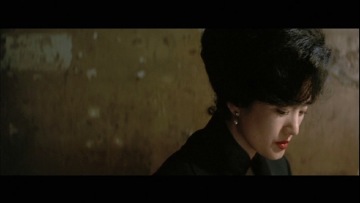 |
| She: Gong Li plays a mysterious gambler whom Tony fails to know. Unwilling to open up on her past, she nevertheless becomes a repository for Tony's secrets. |
As Tony concedes point blank, he could just as well have been speaking about himself. Unable to jettison the weight of his past, he can’t commit to the developments of the present. No, there is no substitute. He cannot jettison his memories of the old Su Li-Zhen, but can he make one move towards embracing the present Su Li-Zhen, knowing she is not a substitute for the other? Well, he does try. But the irony is that it is not so simple: he is not the only one who cannot overcome existential dilemmas. ‘If you can let go of your past one day, find me,’ The question is addressed to Gong Li, and WKW is hinting that perhaps she is prone to the same tendencies. We have been with Tony for so long that we know his history; the secret which he shares with so few others. But with Gong Li we are given the chance to see this from the outside - another character with a mysterious enigma, a weight she carries from her past which paralyses her - yet she, too, is left in floods of tears. Why can’t she make a decision which may bring her happiness?
With this discordant paradox ringing in our minds we return to a meal with Tony and Ziyi. This is a separate occasion from the meal which featured in the film 18 months after Christmas 1968 (as visible from the different clothing) and, as Tony says it is the last time they met, it is presumably a later occasion. This complex ellipsis is in line with the fact that both these meals are something like epilogues. Not just for Ziyi’s connection with Tony, but for the film as a whole, as the sequences are the only events to occur after Tony’s failed attempt to rediscover Gong Li in 1969. The first sequence (where Ziyi is in a dress with vertical stripes) features her asking Tony for a favour. She has fallen on hard times and requires a guarantor for a nightclub job. At the second meal, Ziyi is due to leave for Singapore the following day. At both meals Tony wears his best mien of calm and control - he reminds Ziyi of their status as ‘drinking pals’ whilst wearing a smile which now seems cold. Objectively, he appears to have reached a pinnacle in his cruelty at a point when Ziyi is at her greatest need.
When Tony rejects Ziyi one last time, he leaves her the saddest we have seen her throughout the film, whilst exiting still wearing his brutal smile. As the film cuts to the stylised image of him alone in the back of a taxi the voiceover evokes the metaphysical location of 2046 again - except the reference to him leaving 2046 is now excised. No-one has ever returned from 2046. The lure of lost memories is too much, and Tony now seems doomed never to be able to embrace the possibilities of the present. The final zoom into the ‘hole’ of the black orb - the image which started the film - seems to confirm the circularity of his inescapable situation.
There are many richly textured themes which lurk just below the surface of 2046. However, as none of these seem to reach the concrete solutions which some critics want to be spoonfed with, many are easily missed. Two of the major themes which crop up are the substitution of values and commercialism.
The idea of commercialism and its nexus with emotion was one of the clearest themes in Days of Being Wild, and the idea has filtered through more explicitly to 2046. As Ziyi’s character is a prostitute there is the obvious question as to how emotion can ever be substituted as brutally as a transaction. Our natural reaction is to say that the transactional aspect is purely for the physical act of sex. This is the way we have been conditioned: sex can be commoditised, but not love. Yet, in so many WKW films the characters have sought to displace their emotions into interchangeable commodities; objects with verifiable value. From tinned pineapple in Chungking to a minute of time in Days of Being Wild, there is the desire in WKW’s characters to trammel their hearts to measurable values.
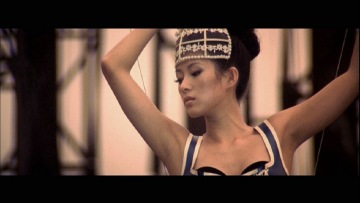 |
| Diva: the film dances carefully over the idea of commercialism and the substitution of values. To add to the question of whether or why the relationship exists at all, the ideas of commerce or proxy values emerge to add an element of doubt. |
The way we are conditioned, commercialism negates the prospect of love. Because of this, when Tony insists on paying Ziyi after sex he is seeking to push the concept of their connection to a transaction, to avoid the immeasurable chasm of emotion. The idea of payment is abhorrent to the viewer as it is viewed as mutually incompatible with love. But then Ziyi does something remarkable. She stores the (symbolic) payment in a box under her bed. This very act removes the money from circulation; takes away its interchangeability. She is trying to make something that is inherently interchangeable become unique and exclusive.
This tension between emotion and commerce is what defines Tony and Ziyi’s relationship. For a while Ziyi seems to have succumbed to the possibility of equating commercial values with love. Given her profession, one might have expected her to be more cynical, but by the end of the film her attempt to ‘pay back’ Tony - a last ditch attempt to ‘borrow’ him in the same way he has borrowed her - results in rejection. At the restaurant, she looks at him through a window and a mask of tears - her money is merely interchangeable, and Tony is not putting his emotion up for sale.
The spectre of commerce also plays a part with the other characters too. Tony’s initial contact with Gong Li is tempered with the mask of a commercial enterprise, and their relationship is peppered with deals and covenants. With Faye, the idea of commercialism is in the background. She does not try to relegate her and Takuya’s relationship to measurable values. But something else is going on. In their wrought exchanges of letters we see how Takuya is investing his emotion on what seems to be a fleeting possibility: the ‘rainbow’ in his heart has been sustained for almost six years. A rainbow is an inherently temporary image, and to sustain it he is asking for active reciprocation. The promise that Faye will go away with him is what has been hinted at from their first scene, a promise worth six years of uncertainty?
And commerce also forms a tool in Faye’s story - she needs the money to escape the dominance of her father. To that end she is working and saving like crazy. When Tony invites her out on Christmas Eve, 1968, her first thought is of the money she is missing out on by not working. Her love needs hard work - and even if her love is not quantifiable, love’s labour is a measurable quantity.
The vagaries of commerce are core to Tony’s very way of life. WKW spares no opportunity to remind us of the chaos of the era’s riots and the associated economic strife. In this time of uncertainty he can write for a living, but he must commit to write anything. Presented thus, he is a victim of the market: his relationship with his art is coloured by ever-present economics. For all the perception that WKW’s works are whimsical forays into human emotion, the film hints that the brutal/comforting idea of commerce is not one which can easily be escaped from.
As a close companion to the idea of commercialism we have the idea of substitution of values - of proxy connections. Indeed, much of the story is about the substitution which Tony tries to make for his lost love. His memory haunts him so thoroughly that he displaces his obsession by a process of association. From Gong Li’s coincidental name and the fetishized number 2046, through to Faye’s fondness of martial arts novels, we are made to appreciate just how every nuance of his lost love affects his perception of otherwise everyday details.
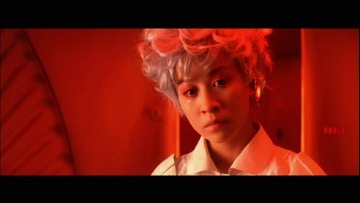 |
| Rouge: Carina's character is the pinnacle of single-minded perseverance. Hurt, frustration and jealousy are her constant companions as she continues to search for her 'no-legged bird'. |
But this idea doesn’t only belong to Tony. The ellipsis of Carina’s story hints that she, too, has been seeking a substitute for her ‘no-legged bird’ - her Days of Being Wild love, dearly departed. As she never finds her true substitute she continues looking, finding hurt and frustration in the process. The alternative which WKW offers is the possibility of a new beginning, outside of the confining ideas of substitution. A real Gong Li, rather than just a cipher for Maggie; or a new 2047 rather than the 2046 Tony thought he was looking for - unexpected new possibilities for him just like he found in Chungking Express.
The most intriguing proxy possibilities are from within the story 2047. Here we are dealing with substitution and proxy connections as that is the stuff of fiction. As he writes the story Tony tells us, ‘I imagined that I was a Japanese man...’ He can use the story to create a proxy connection between himself and Faye: the characters can stand in for more than one person. In the story Takuya initially finds the Faye android as a proxy for his lost love. But something happens. She begins to be an independent entity. And this is the crux of the dilemma: the search for a substitute always ends up fruitless from one point of view, but from another point of view fresh new possibilities arise. From there, it depends on the character’s existential outlook. But the way Tony writes it - tellingly for us - the new possibilities offered by Faye’s autonomy don’t work out. Whether it’s the wrong love at the wrong time or some other reason, Tony cannot envisage the new possibility coming to fruition.
Most WKW fans naturally see the film as the culmination of a trilogy started by Days of Being Wild and including ITMFL. To this reviewer, it is harder still to escape the similarities, thematically at least, between 2046 and Ashes of Time. Both films suffered equally tortuous geneses, and both also feature similarly extensive casting. It is perhaps because of the starry casting - and the associated nightmarish shooting schedule - that the films run as vignettes which are loosely tied together. In 2046, it is Tony Leung Chiu-Wai who is the fulcrum around which the other narratives orbit, and his decisions are very telling.
One of the key outcomes of 2046 is Tony rejecting connection in favour of - in a sense - a lone taxi journey to an uncertain destination. If we look to Tony Leung Kar-Fei in Ashes, we see some kind of explanation. ‘I only ever wanted to know how it felt to be loved,’ he admits. ‘But I only seemed to hurt people.’ In that film, he seeks to explore the possibilities of connecting with other people. But the results are disastrous. In the end, he treasures one relationship - ‘the untasted fruit’ - which never comes to fruition.
The relationships reflect an insecurity which runs through the characters in Ashes, and they play this out against the exiled vista of some magnificent desert. In 2046, we find the story crossing between Singapore and Hong Kong. This returns to one of the most interesting quandaries running through all of WKW’s works: the idea of belonging compared to the idea of rootlessness. The theme surfaced in Chungking and was widely attributed to pre-1997 anxieties, this being even more acute in 1997’s Happy Together. But in his 1960’s trilogy of films, WKW presents the theme more subtly. One of the core ideas is that Hong Kong is by default a waystation - and the tension is between defining the place as a temporary stopping point for his characters, or the ‘home’ which Tony says Singapore wasn’t.
In 2046, when Tony returns to Hong Kong he says he doesn’t know how long he will stay, hence his penchant for hotels. In the background, the chaos of the era’s riots adds an extra urgency and tension. The riots occurred for a myriad of reasons, from the spillover effects of the Cultural Revolution to more basic concerns, such as the price of a ferry ticket. The assertion of discontent divided Hong Kong, but was also a crucial point in the evolution of an identity.
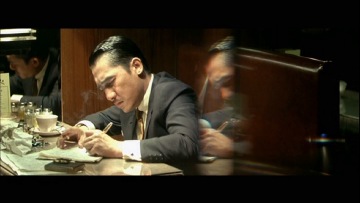 |
| Ghostwritten: the film balances the idea of narrative causality with the concept of nodular connections - all the women in the film keep to different spheres, yet they have all formed part of the life of Tony. In contrast, the political contexts hinted at by the film may have universal importance, yet not be of individual importance at all. |
Against this backdrop of shared cultural memory, WKW is characteristically obtuse. We do not follow how Tony fits into this cultural landscape. Instead, we focus on how his memory of Hong Kong has been shaped by his personal experiences. Take the number 2046. Based on a hotel room - a location - his memories are encircled by the artefacts which help him recall them, the number 2046 being one such artefact. The number holds a wider cultural significance now as it marks the last year of Hong Kong’s 50 year political transition period since 1997. The fact that WKW doesn’t focus on this aspect at all means that even though he came across the number because of its wider, shared cultural implications, he avoids any exposition on this in the film.
This sense of counter-intuition is not impetuous, but actually underlines how WKW wants to place his stories and characters in the context of other events. They are nodular and chaotic - a bumped shoulder doesn’t lead to a stack of tinned pineapples, yet both are key events and the consequences lodge in a character’s mind ‘for 10,000 years’ (we’re talking Chungking here). Yet a curfew does lead to a guy staying indoors and writing a piece of science fiction which is of significance to his development - even if the reasons for the curfew and the surrounding events are not otherwise important to his story.
What this adds up to, other than WKW’s love of serendipitous developments, is not altogether clear. But the side-by-side seating of WKW’s intensely personal stories with political and historical events - more apparent since Happy Together - is interesting. The heart of his stories is still placed determinedly away from these social upheavals (there is no direct link between the riots and Tony in 2046, just as there was no direct link between Tony’s development and the death of Deng Xiaoping in Happy Together), but they reflect how WKW’s individuals can never be entirely individual and separate from the societies they exist in. But, crucially, neither do they have to be protagonists in these events. What this adds up to is an imperfection in looking at the characters as either entirely separate from society, or merely cogs within society.
Speaking of imperfection, WKW reserves some of the best fun for quirks of perception and prejudice, and how things are never as they appear. With Faye’s supercilious father, we have a man who hates the Japanese, but would hate more the calumny of letting his daughter go. And he loves western opera, or at least the ability it has when played loudly to mask his family arguments. When Tony first meets this man he eyes Tony suspiciously. ‘Our customers are decent people,’ he says. Of course, he is putting on a typical display of face, hiding the seediness and violence which appears to have set in. Ironically when Tony gives his profession as ‘writer’, the man’s face lights up - a fellow artiste indeed.
Tony’s profession fascinates WKW. It is common for many seasoned authors to write about the business of their profession, and in this sense WKW shows his hand here: this most visual of directors is more akin to a writer than almost anyone else. Tony the author provides an analogue for WKW the auteur. He straddles a profession where he can be elevated as an artistic genius. Yet it isn’t always so glamorous when he simply needs to feed himself, when 1,000 words pays ten dollars.
Tony’s lifestyle is very much allied to his career. He makes this clear from the outset as, after he says he will write anything to survive, he tells us how he got used to the cad’s life. In other words, his playboy living is not just a representation of a change in his basic character, but also a tool of his trade. Or, to bring on a Chungking concept, a uniform. Perception is everything here. WKW makes the explicit connection in one of the goofiest jokes in the film - in voiceover Tony tells us ‘the economy went back to normal’, and we are treated to the sudden strains of his vigorous lovemaking. Once again, another idea is commercialised, commoditised.
This isn’t an illustration of art corrupted, though. The film is rife with imperfect communication, and it is Tony the author who acknowledges the inescapability of this situation. When he writes 2046, he tells us certain elements are distinct to his history. Whatever inner thoughts he has cannot be perfectly communicated. Rather than just keep this idea to the aspect of storytelling and the interface with commerce (a point made more topical by the prominent LG logo which occasionally floats into frame), WKW bleeds it into communication as a whole. More than once Tony tells us of some thought or revelation he has had, before expressing disbelief that another character hasn’t had the same thought. This standpoint is ironic: a man who makes a living from conveying his thoughts has eschewed corruptible communication in favour of the ‘untasted fruit’ of unfulfilled expectation.
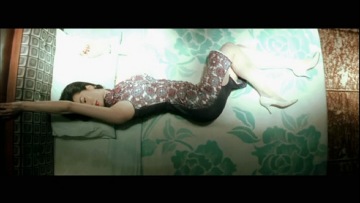 |
| Sleep: 2046 is conspicuous in its stylisms, and its referencing of previous WKW works. This 'reiterative' approach allows the film to thrive on its own idiosyncrasies and dig deep into its themes. |
As a film, 2046 shows a clear desire to assert the identity of WKW’s existing canon, and it is here that we wade into the whole debate as to whether it is a move forward or a look back. The film starts off with a voiceover, a device used extensively in WKW’s back catalogue. Deliberate and conspicuous, it seems almost like an early warning to anyone who wants to talk about ‘trademarks’, ‘summaries’ (WKW’s own description) and, perhaps more bluntly, ‘backward steps’.
But very few are able to say what the film is supposed to be a step back from. Perhaps these critics are the ones who hail ITMFL primarily for its break with WKW’s tradition of complex, non-linear narratives, conspicuous displays of technical experimentation and apparently freeform plotting. No, 2046 isn’t a step back in this sense. Rather, ITMFL strained to break free of the ‘mould’ which was perceived to surround WKW. Whilst there is little doubt that ITMFL is a leaner, less meandering film than 2046, the sheer scope of 2046 enables WKW to dig deeper. And this isn’t just in the sense of themes, but also in the film’s very conspicuous stylisms.
The results are pretty spectacular - as one has come to expect from WKW - at times almost too spectacular. Occasionally - as with Ashes - the film does over-egg the style a bit. But the key is that the style is not the content. Almost everyone who watches the film has a niggle with a certain shot or a certain edit. These are forgiven because there is something beyond the style - the look and feel is like a vehicle to get you into a certain mindset. What is it that sets apart memories from waking life, or dreamed possibilities from dry reality? WKW and co (i.e. editor/production designer, William Chang and the various directors of photography) literally blur these lines by daring to experiment despite the risk of critical backlash - 2046 certainly was not a film made by rote.
The sheer length and irregularity of the shoot may explain why the film required three cinematographers (WKW regular, Chris Doyle; Lai Yiu Fai - Doyle’s former camera assistant; and Kwan Pun Leung - the video artist who made the documentary, Buenos Aires Zero Degree, i.e. The making of Happy Together - in fact one may possibly count four cinematographers at one point, although it isn’t clear what input was made by Jean-Yves Escoffier before his untimely death). Yet rumours regarding a split between WKW and his most famous DP, Chris Doyle, persist. That Doyle refers to ‘us’ and ‘we’ when talking of 2046 is something of a ray of light for possible future collaborations.
Let’s also spare a few words for the film’s music. It isn’t just a case of being the ‘right’ music - after all, when one thinks of 1960’s Hong Kong, baroque waltzes, Nat King Cole singing a Christmas song and western opera aren’t the first things which spring to mind - but the point is that choice and memory are subjective. WKW uses particular songs to bracket themes and characters, in as conspicuous a manner as Sergio Leone used Ennio Morricone’s themes in his films. The beauty is that whatever reasons one can think of for choosing a song or repeating it, the result on the mood and the tempo of the film is something which occurs at a primal, instinctive level, and WKW’s judgement - possibly a mixture of experience and serendipity - is on-key without being predictable.
In terms of performances, 2046 is interesting. Tony Leung’s central characterisation is mostly a tour de force. But occasionally there is an almost parodic moment - an overlong smile, an exaggerate glance - which breaks the spell. Yet, overall, I cannot escape the conclusion that Tony Leung - and possibly only Tony Leung - can sometimes create the most incredible cinematic moments under the direction of WKW, invoking a sheer pathos which seems to be about something other than acting. Quite remarkable.
Zhang Ziyi is also an eye-opener in this film. Previously best known for her gritted-teeth expositions in Ang Lee’s international smash, Crouching Tiger, Hidden Dragon, she hits the target very well in this film. Whether her extrovert character invokes empathy depends on the take of the viewer, but there is little doubt that she has made her mark here. Faye Wong is quite wonderful, but it is hard to say whether this is down to acting. She has a bright, inspiring presence in the film - her joy and sadness have a profound effect on the feel of the film. WKW has cleverly pieced this together so that Tony is like us - a viewer in her drama. And we are like Tony - affected by Faye’s emotions.
Takuya Kimura is effective. A Japanese superstar best known for his pop career, WKW has pared down his character to a cipher in the 1960’s, and Tony’s alter ego in the sub-story. It is in the sub-story that he provides his fullest performance, with the evocation of his insecurity and doubt being well-played. Carina Lau is also very effective. In a way, WKW is playing on her media persona - feisty on the one hand, and vulnerable on the other - to provide a starting point. From there, her small role is touching. Gong Li - whom many had written off as an actress since the end of the 1990’s - never misses a step and is a wonderful presence. She shines (darkly) in her paradoxical, complex - if rather short - role in 2046.
So what can be said about 2046 overall? It’s really quite hard to give a summary. Surrounded by all the hype over its creation, 2046 is classic WKW in that he doesn’t go for easy crowd-pleasing. Indeed, many seasoned critics professed to find the film unfathomable. One of my favourite quotes was that parts of the film had ‘an edgy stillness’ which ‘sidles alongside Waiting for Godot.’ Quite.
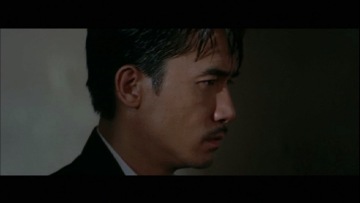 |
| The silence: at times introspective and contemplative, at others garish and bold, 2046 eschews an easy approach through the possibilities offered by character development, narrative and audience expectation. The destination of Tony's journey frustrates received wisdom regarding character development, but provides a fascinating glimpse of the existential choices faced by WKW's characters. |
One key point reviewers have made is that Tony Leung’s character is only intermittently likeable. With his connection to Faye we see a side to his character which hints at redemption. But by the end of the film, with his cold rejection of Ziyi, he is less likeable than at the beginning. This is inverse to the redemption structure which often occurs in fiction, and which viewers tend to expect. What is going on here? A clue appears in the form of Fallen Angels. In that film, Leon Lai’s laconic and lazy hitman rejects a possible connection with two women and ends up choosing a suicidal exit. The logic of this decision seems perverse, but he tells us it was his decision, even if he doesn’t know whether it was a right or wrong one.
At the start of Fallen Angels, Leon’s voiceover tells us how he never sat next to his ‘partner’, Michelle Reis, until 3 years into their association. The reason he gives? ‘Emotions are very hard to control...’ and so he does his best to keep their relationship on a business footing. This tension, this dichotomy - between uncontrollable, unquantifiable, ‘free’ emotion, and the mechanics of commercial or otherwise impassive, interchangeable, interaction - is what underpins 2046 and Fallen Angels especially.
By the end of Fallen Angels, Leon’s prophecy regarding emotions becomes true. Commitment, in the darkest corners of the WKW world, typified by Fallen Angels and 2046, is not just about falling in love. It’s about losing control. WKW’s characters are forever trying to quantify their emotions by commodities, by everyday, interchangeable objects - from ideas about time and leases, to pop figures and household goods - as that is what trammels their existence. The frustrated love which explodes from Fallen Angels is a sign of what occurs when they lose control of their emotions.
And so Tony in 2046 is a development of this idea. From his past, he also knows that emotions are hard to control. Unlike Carina’s character, who is an example of the power of perseverance, but also a tragic portrait of uncontrolled emotional frustration, he chooses to keep control of his emotions. Cold, brutal control. Has he achieved this control at the end of the film? He certainly seems to have reached a stage when he can control (i.e. reject) emotional engagement. But all this comes at a cost. He doesn’t seem likeable to us. Ironically, he appears to have failed our gut instinct appraisal for a fictional hero: he has not overcome a barrier or developed into a ‘better’ person. But consider this before we judge him: he has chosen his path - like the sage in Taoism who ‘manages affairs without action’, or the Buddhist who realises all things are impermanent, he has moved closer to the ‘nothingness’ and disconnection which feature in both philosophies. The tragic flip-side of this is that he can never fully escape his memories: he lives in the shadow of his regret.
And 2046, does it live in the shadow of its creation? Just like Ashes of Time, I feel the answer in the long run will be ‘no’. That 2046 feels, at times, somewhat overblown is admittedly true. That, outwardly, the film appears unfocussed is also a brutally honest appraisal. But these complaints really do nothing to dent the underlying strength of the film. Liberated from the artificial pressure of ‘breaking new ground’, WKW has created what is arguably a masterpiece: something which communicates his aesthetic and metaphysical intentions from the deepest levels. No, not everyone will like 2046 - it has divided WKW fans the world over, and it remains to be seen whether it has won WKW many new fans like ITMFL did - but in the end WKW has not settled for less: he has not compromised for the sake of acceptance. I found this film moving, and capable of the kind of emotional soar which typifies WKW at his best. For all the debate as to how the film ‘could have’ been, 2046 already deserves to be a classic.
|